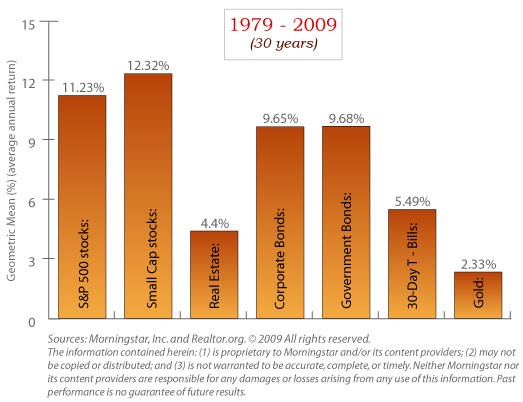Why Invest in Stocks?

Simply put, when you have money to invest for an extended period of time (like 20 years or more), the stock market historically has provided the greatest return.
When most people are able to save money, they usually put it in the bank. Banks usually pay interest on the cash in your account, so if you have $1000 in your savings account and the bank pays you 3% interest then at the end of a year you will have about $1030. Once the savings balance gets bigger, a lot of people hope to earn more than what the bank is paying in interest, so they invest in real estate, stocks, bonds, and/or gold.
Historical Returns of Investments
While no one knows for sure what will happen in the future, a look at historical returns shows how these different investments have performed over time.
Here’s a chart of average percentage returns for the 30 year period from 1979 to 2009:

From this chart we see that Small Cap Stocks and the S&P500 Stocks have performed the best at 12.32% and 11.23% compared to Bonds at 9.6%, Real Estate at 4.4%, and Gold at 2.33%
So what does that mean? Over time there is a HUGE difference between 12% and 2%. Here is another way to look at it–this chart shows the growth of $100 for the 46 years from 1965 to 2011.

So, would you rather have $1,336 or $6,072! That’s a big difference for just $100. For $10,000 the results would be exactly 100x or $133,600 versus $607,200.
Finally, looking at a longer time period, this chart looks at average returns for 85 years and shows that Small Stocks were the best investment with an annual return of 16.5%. In this table you also need to note the Standard Deviation column which measures the variance or volatility of the returns. It shows that Small Stocks also have the highest variance. This is why we say “over time” that stocks have the highest returns. If you looked at just one year or even five years, you might not see the same results because stocks are so volatile, but the longer the time period you have to keep the money invested the better it is to invest in stocks.
